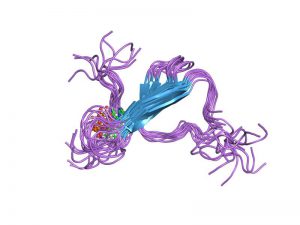
Representation of the molecular structure of the tau protein. Credit: European Bioinformatics Institute
Researchers at the University of Pittsburgh School of Medicine in collaboration with the University of Chile and the International Center for Biomedicine have developed a blood test that could potentially detect Alzheimer’s disease in its earliest stages, even before symptoms emerge.
Alzheimer’s disease is a serious neurodegenerative disease affecting millions of lives annually. To date, 5.4 million Americans are affected by the disease, and over 96 percent of those affected are 65 years old or older. Typically, the symptoms of Alzheimer’s develop slowly and worsen over time. Therefore, it’s crucial to detect the disease in its early stages in order to delay disease progression.
The test, which needs to be evaluated in a larger population, has provided a promising new approach to detect Alzheimer’s even before symptoms emerge.
Dr. Oscar Lopez and Dr. James Becker of the Pitt School of Medicine, co-directors of the Alzheimer’s Disease Research Center, led the efforts in Pittsburgh. The research in Chile was led by Dr. Ricardo Maccioni and Dr. Andrea Slachevsky of the University of Chile Faculty of Medicine
The international research team first developed the test by measuring tau, an important brain protein that can lead to neurodegenerative disorders such as Alzheimer’s disease. The researchers measured levels of pathological and normal forms tau proteins in a small group of patients and correlated the ratio of the two with the state of disease.
The team found that higher ratios of abnormal tau to normal tau were found in patients diagnosed with Alzheimer’s when compared with normal study participants. More specifically, high ratios were shown to correlate with lower brain volume in areas important in cognitive ability.
This technology is a step forward in using biomarkers to understand the pathology of Alzheimer’s disease, according to the researchers. The results of the study were published in the Journal of Alzheimer’s Disease.








